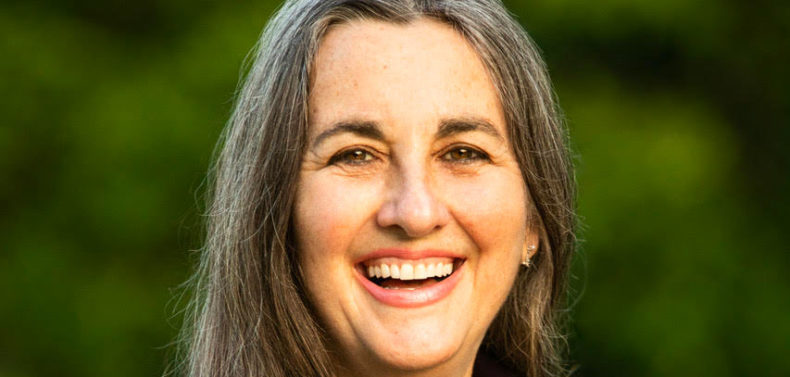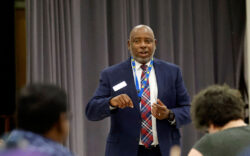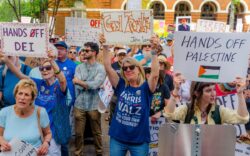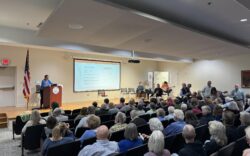After her first book, Ecology of a Cracker Childhood, garnered an American Book Award in 2000, the recognition catapulted Appling County native Janisse Ray onto the national stage as a lyrical environmental writer and helped her create a career of writing, teaching and activism.
Ray comes to the UGA School of Environmental Design, in room 130 of the Jackson Street building, at 4:30 p.m. Thursday, Dec. 2 to read from and discuss her eighth book, Wild Spectacle: Seeking Wonders in a World Beyond Humans. It’s her only stop in Athens on a whirlwind book tour, and it promises to be as enjoyable as Ray herself.
If John McPhee can compile his various New Yorker pieces into a book, Ray thought, why couldn’t she do the same? So she gathered essays she had already written. In collecting her work, she looked for common threads and themes and settled on the pursuit of wildness.
The book is divided into three parts: “Meridian,” “Migration” and “Magnitude.” In “Meridian,” Ray takes us to Montana, where she earned an MFA in environmental writing from the University of Montana. She ventures into the Bob Marshall Wilderness; to Wild Horse Island in Flathead Lake; into the Yaak, an area in the extreme Northwest corner of Montana, where her friend and fellow writer Rick Bass has lived and fought for wilderness for decades; and to an isolated cabin in Helena National Forest. Having lived in Montana and trekked into the Bob Marshall, I found her story about encountering a herd of elk there during a rainstorm—the animals didn’t smell or really see Ray and her husband—both mystical and moving.
She writes: “Looking back, I remember those moments as hypnosis. I was under the spell of wilderness and under the power spell of the elk. If the cow had asked me to go with her, I would have. For this one fleeting interlude, I belonged to her world.”
I won’t talk about the other Montana stories Ray shares, but trust me, after reading them, you’ll want to visit, as I do most every day. Please refrain from doing so. Confine your Montana visits to Internet searches—the state is being loved to death.
In the “Migration” section, we accompany Ray to the Nicoya Peninsula in western Costa Rica; to the avian and aquatic life of Belize; to the desert Southwest; to Michoacán in southern Mexico to see monarch butterflies; and to a dinner party with friends in Sitka, AK, where almost everything served is locally sourced. The people Ray introduces us to are as memorable as the environment she shows us. I really wish I could have been on these trips with her, but in reading her account, you can almost feel you were.
The last section, “Magnitude,” has several stories from the South, close to Ray’s home in Tatnall County, about 50 miles west of Savannah. We see her paddling a kayak through Okefenokee and towing behind her a sick child in another kayak. “Okefenokee Swamp is a large bog, a depression, a peat-maker, a mosaic of peat batteries—a saucer, not a cup. There is very little solid ground, only floating sod. The sphagnum that defines the bog is so thick it appears weight-bearing, but when you step onto it, you sink.”
On the Appalachian Trail near Springer Mountain, darkness overtakes her, unprepared, and she removes her shoes to feel the trail on the earth. She muses about darkness, writing, “I have found out that what we miss, in our love for daylight and things of day, is a nocturnal natural history of fabulous proportion, Spring and fall, birds fill the night sky, mostly unseen. High in the universe yellow-billed cuckoos migrate, their bodies silhouetted against harvest moons.”
No matter where she travels, Ray finds wildness. Or maybe she travels to places renowned for wildness. In Crystal Springs, FL, we meet manatees. In an Oxford, MS cemetery, Ray goes spider hunting with two women who love all varieties of arachnids.
“My favorite parts of nature writing are moments of reflection, when I get to philosophize a little and think ‘Why did it happen?’” Ray says. “I feel really grateful that I get to answer that question, ‘What does it mean?’ For me, that’s the best part of being a writer.”
Like what you just read? Support Flagpole by making a donation today. Every dollar you give helps fund our ongoing mission to provide Athens with quality, independent journalism.










